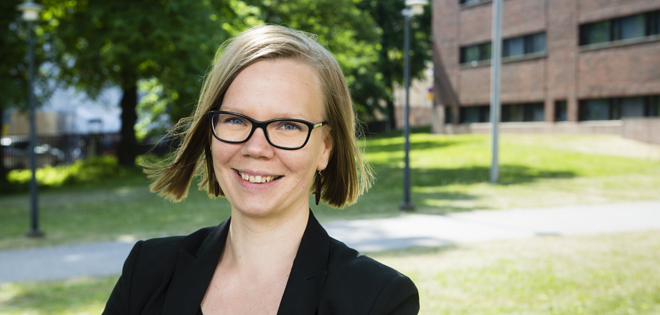Mailing letters increased social benefit take-up

Households that received a directed mailing informing them of the guarantee pension program were faster and 50 % more likely to apply for the benefit than households that relied only on public information. M.Sc. (Econ.) Tuuli Paukkeri defends her doctoral dissertation on 8 June, 2018.
 The doctoral dissertation of Tuuli Paukkeri will be publicly examined at the Aalto University School of Business on Friday, June 8, 2018.
The doctoral dissertation of Tuuli Paukkeri will be publicly examined at the Aalto University School of Business on Friday, June 8, 2018.
In Finland, the guarantee pension scheme ensures a minimum income level for low-income pensioners. When this entirely new benefit program was introduced in spring 2011, a part of the eligible population received a letter informing them of the benefit and a prepopulated application form.
Tuuli Paukkeri and Tuomas Matikka investigate how the letter affected the likelihood that a household applied for the benefit. Their study shows that the letters had a considerable impact on take-up. Households that received the communication we both faster and more likely to apply for the benefit: By the end of July 2011 almost all households (95%) that received the letter had applied, while 60% of the rest of the eligible population had done so.
In particular, old-age pensioners and pensioners who received both a national pension and an earnings-related pension benefitted from the letter. Paukkeri argues that pensioners with both types of pension income were more likely to be uncertain of their eligibility. Meanwhile, the Finnish Social Insurance Institution (SII) could identify the eligible households reasonably well.
"When benefit eligibility is known to the authorities, but not the eligible households themselves, directed mailing is an easy and effective way to reduce benefit underutilization", says Tuuli Paukkeri. "The prepopulated application form further facilitated the application process."
The study is part of Tuuli Paukkeri's doctoral thesis in economics. In her thesis, Paukkeri explores how well different policies achieve their goals, be they to reduce poverty or health problems.
The impact of social benefits is weakened, if those eligible to the benefits do not have the skills or courage to apply for them. Paukkeri studied the take-up rate of Finnish social assistance and housing allowance and noticed that households that only experienced a temporary drop in their income level were less likely to apply for the benefits. This is at odds with the intended temporary use of social assistance. Nevertheless, the households that most needed the benefits received them.
"For a policy to be successful, the details of the program need to support its overall goals", Paukkeri argues. "If eligible households are unaware of benefits, or companies do not understand the incentive schemes that should guide their actions, then the policy will not generate the desired outcomes."
Paukkeri's doctoral dissertation consists of four essays. In addition to social benefits, she examines the experience rating scheme in employers’ disability insurance as well as optimal tax and transfer policies for poverty reduction in developing countries.
Tuuli Paukkeri will defend her doctoral thesis in economics on 8.6.2018 at the Aalto University School of Business. The title of her thesis is Essays on public economics.
The public examination of the dissertation is organized in the main building of Aalto University School of Business (Runeberginkatu 14-16), in hall B200, at 12pm. The opponent is Professor Pierre Koning (VU Amsterdam and Leiden University) and the chairperson is Professor Pertti Haaparanta (Aalto University School of Business).
Dissertation:
Essays on public economics. VATT Publications 72
More information:
Tuuli Paukkeri, +358 295 519 411, [email protected]
Tuuli Paukkeri
Press release
Press release
Social security, taxation and inequality
VATT
disability pensions
guarantee pension
housing benefit
policy measures
social assistance
take-up
taxation

